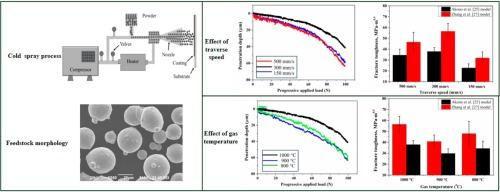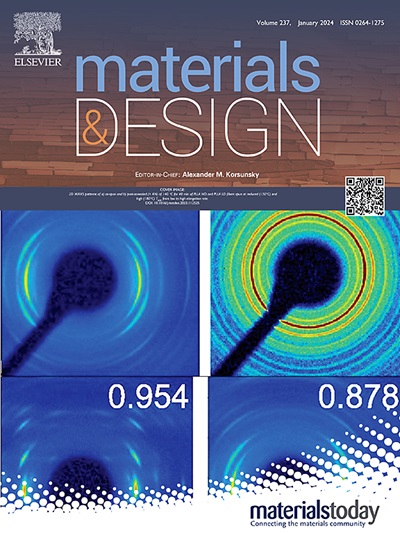Evaluating fracture toughness of cold sprayed IN625 coatings: Micro-scratching method
IF 7.6
2区 材料科学
Q1 MATERIALS SCIENCE, MULTIDISCIPLINARY
引用次数: 0
Abstract
Cold spray deposition of metals and alloys has gained considerable attention due to its advanced applications across various industries. This technique offers numerous advantages, including the absence of phase changes and oxidation. However, the process presents challenges due to its inherent complexities. Plastic deformation is crucial for the successful deposition of powder particles during cold spray. Therefore, achieving an optimal level of plastic deformation is essential. Fracture toughness is one of the important properties that can help understand the degree of plastic deformation in cold-sprayed coatings. Yet, measuring fracture toughness in these coatings is challenging because most evaluation methods are destructive and require large sample sizes. This study investigates the feasibility of predicting the fracture toughness of cold-sprayed coatings. Specifically, the micro-scratching method is employed to predict the fracture toughness of cold-sprayed IN625 coatings. IN625 is selected because of its high-end applications in sectors such as nuclear, marine, and aerospace component manufacturing. In addition to evaluating fracture toughness, the deposited coatings undergo rigorous testing and characterization to establish the microstructure-process-property relationship. The scaling of frictional force and fracture toughness confirms the validity of using scratch data for fracture toughness calculations. Hence, fracture toughness of the resulting coatings was successfully evaluated.

评估冷喷 IN625 涂层的断裂韧性:微划痕法
金属和合金的冷喷沉积技术因其在各行各业的先进应用而备受关注。这种技术具有许多优点,包括不会发生相变和氧化。然而,由于其固有的复杂性,该工艺也面临着挑战。塑性变形是冷喷过程中成功沉积粉末颗粒的关键。因此,实现最佳的塑性变形水平至关重要。断裂韧性是有助于了解冷喷涂层塑性变形程度的重要特性之一。然而,测量这些涂层的断裂韧性是一项挑战,因为大多数评估方法都是破坏性的,而且需要大量样本。本研究探讨了预测冷喷涂层断裂韧性的可行性。具体来说,采用微划痕法预测冷喷 IN625 涂层的断裂韧性。之所以选择 IN625,是因为它在核能、海洋和航空航天部件制造等领域的高端应用。除了评估断裂韧性外,沉积涂层还要经过严格的测试和表征,以建立微观结构-工艺-性能之间的关系。摩擦力和断裂韧性的比例关系证实了使用划痕数据进行断裂韧性计算的有效性。因此,我们成功地评估了所得涂层的断裂韧性。
本文章由计算机程序翻译,如有差异,请以英文原文为准。
求助全文
约1分钟内获得全文
求助全文
来源期刊

Materials & Design
Engineering-Mechanical Engineering
CiteScore
14.30
自引率
7.10%
发文量
1028
审稿时长
85 days
期刊介绍:
Materials and Design is a multi-disciplinary journal that publishes original research reports, review articles, and express communications. The journal focuses on studying the structure and properties of inorganic and organic materials, advancements in synthesis, processing, characterization, and testing, the design of materials and engineering systems, and their applications in technology. It aims to bring together various aspects of materials science, engineering, physics, and chemistry.
The journal explores themes ranging from materials to design and aims to reveal the connections between natural and artificial materials, as well as experiment and modeling. Manuscripts submitted to Materials and Design should contain elements of discovery and surprise, as they often contribute new insights into the architecture and function of matter.
 求助内容:
求助内容: 应助结果提醒方式:
应助结果提醒方式:


